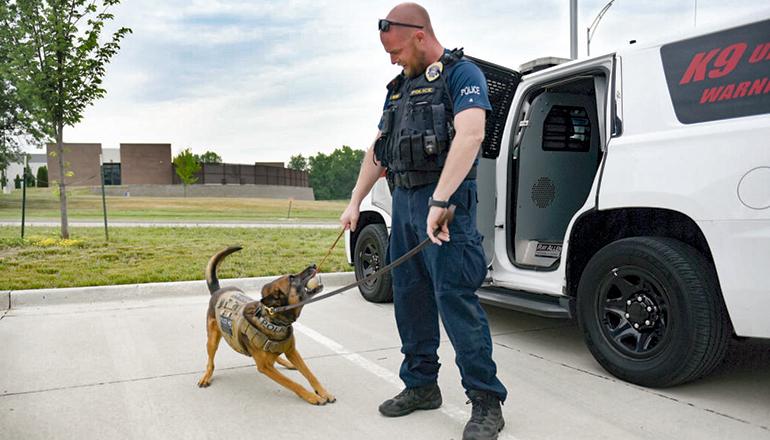(Missouri Independent) – Now that cannabis is legal in Missouri, drug-sniffing police dogs face early retirement if they are attracted to the smell of marijuana.
Because some police dogs are sensitive to the odor of pot, they can compromise an investigation and prevent a successful drug prosecution.
If a dog is trained to detect marijuana as well as illegal drugs, it cannot separate them for a handler. The dog also cannot distinguish between a single joint and an unlawful amount of marijuana.
The prevailing solution is to retire those dogs and train new ones to identify only illicit drugs.

Under Article 14 of the state constitution, which governs cannabis, evidence of marijuana alone can no longer be the basis for a search in Missouri “without specific evidence indicating that the marijuana is outside of what is lawful for medical or adult use.”
Sgt. William Brown, head K-9 authority at the Kansas City Police Department, said, “A defense attorney is going to say, ‘Your dog hit on marijuana’ if there’s even one joint, no matter if there was cocaine or whatever else alongside it.”
All police dogs trained to detect marijuana were “discontinued” in Kansas City immediately after cannabis became legal in November.
“Everything becomes fruit of the poisonous trees if we use these K-9s,” Brown said.
Seeing it coming
Anticipating legalization, Capt. Brian Leer of the Boone County Sheriff’s Department said law enforcement “read the writing on the wall” and ended cannabis training for dogs in 2018.
“We had the forethought to stop training marijuana on dogs several years back,” he said.
The department also began taking steps to lessen the cost of purchasing and training new dogs.
Dogs for police work typically come from an elite lineage and can cost $9,000-$10,000 each. Their specialized training is also expensive and has, until now, often required the services of handlers in other states.
The Boone County Sheriff’s K-9 program sidestepped this problem a few years ago and now promises an eight-week course at $4,000 per dog. That is much cheaper than the $15,000-$16,000 charged elsewhere, not counting the cost of travel, food, and housing a dog.

A grant from the Missouri Department of Public Safety called the Canine Replacement Grant, can even cover the cost, as it has for the Columbia Police Department, which is replacing two dogs.
The demand for replacements took off when the grant became available, said Chris Smith, head K-9 trainer for the Sheriff’s Department. Since 2018, Smith said he has averaged three K-9s for each eight-week class. This year, he expects to be training six or more new dogs during each class.
Training dogs to detect drugs requires patience and repetition. The dogs are rewarded with play and toys when they recognize and become alert to the smell of a drug.
Once the connection is made, handlers will hide small baggies with various substances in a room for the dog to find. The next step is to master “blind searches,” where neither the dog nor the handler knows where substances are hidden.
Dogs can learn to detect these substances even when they’re placed in vacuum-sealed bags. Then later, they can move on to more difficult tasks like scent-tracking and aggression training.
Different decisions
Not all law enforcement agencies in Missouri are retiring their drug-detection dogs, however.
Some departments are reluctant to give up “perfectly good dogs,” Smith said. “Some agencies are waiting to get in on the DPS grant, and they’re still using their dogs that are marijuana-trained because there’s no case law yet.”
The St. Louis Metropolitan Police Department, for example, has determined that their dogs can still serve without risking an illegal search.
Some of their K-9s are trained in multiple skills and can continue to serve in those capacities, said Sgt. Charles Wall. These can include dogs with skills in bomb detection and tracking suspects.

Because the constitutional amendment governing legal cannabis is in its infancy, some handlers have decided to wait until courts have interpreted the language before revising their procedures.
“The fact that we say we can’t use the dog to develop probable cause — there’s not case law yet where the courts have actually said ‘you can’t do this,’” Wall said.
For those situations where marijuana is still illegal, “it is our interpretation of Amendment 3 that the odor of marijuana may still establish cause to search in certain situations,” he said.
Dan Viets, an attorney and Missouri coordinator for the National Organization for the Reform of Marijuana Laws, said he was not convinced that detection of marijuana serves any purpose for law enforcement today.
“An alert from a dog to the odor of marijuana is absolutely meaningless,” Viets said.
The courts will bear out that any searches by state law enforcement on the basis of marijuana, whether with probable cause or not, will be illegitimate, he said.
“If they’ve obtained specific evidence to pursue a search on what they suspect to be illegal marijuana, they don’t need a dog,” Viets said.
He described prohibitions on using marijuana detection for any kind of search as nearly insurmountable, except for federal law enforcement.
Smith suggested that a dog “imprinted” on marijuana could be used after probable cause is established to suspect illegal marijuana.
“Then we’re just using a dog as a locator,” he said.

A retired K-9 is likely to remain part of its handler’s family. Nero, a 6-year-old Belgian Malinois working for the Columbia Police Department, is retiring to a more leisurely life with its handler, Officer Eric Wiegman.
Even working K-9s often live with the handler, who is compensated by the agency for veterinarian care, food, toys, and other supplies.
Although the compensation stops when dogs are retired, Wiegman seems happy to assume responsibility for Nero’s care.
“My kids wouldn’t know what to do without him at home,” he said.
(Photo by Clayton Vickers courtesy Columbia Missourian)


